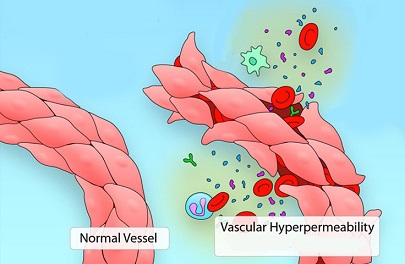BREAKING NEWS! COVID-19 Infections Regardless Of Being Mild Or Severe, Linked To Renal And Pulmonary Endothelial Hyperpermeability!
COVID-19 News - Renal And Pulmonary Endothelial Hyperpermeability Jul 12, 2023 1 year, 8 months, 3 weeks, 7 hours, 31 minutes ago
Study also found that the endothelial angiopoietin/Tie2 system did not play a role in endothelial permeability but increases in circulating angiopoietin-2 was associated with the development of AKI and ARDS.
COVID-19 News: In a new study conducted at the University of Amsterdam, researchers have discovered a concerning phenomenon associated with COVID-19 infections. Regardless of the severity of the disease, COVID-19 patients experience renal and pulmonary endothelial hyperpermeability, a condition characterized by increased blood vessel leakage. These findings shed light on the pathophysiology of acute kidney and lung injuries observed in COVID-19 patients and highlight the potential complications that can arise from the disease.

The study aimed to investigate the alterations in endothelial permeability in COVID-19 patients with varying symptomatology. Plasma samples were collected from patients admitted to the ward or intensive care unit (ICU) and healthy individuals for comparison. Human kidney and lung endothelial cells were exposed to the patient plasma to evaluate their barrier function, which was measured using electric cell-substrate impedance sensing. The study team also examined the levels of circulating markers associated with endothelial dysfunction and glycocalyx degradation.
The results of the study revealed that plasma from COVID-19 patients led to a reduction in endothelial resistance compared to the control group, indicating increased permeability of blood vessels. Surprisingly, the severity of the disease did not affect the plasma-induced endothelial hyperpermeability. However, over time, severely ill patients showed increased levels of circulating angiopoietin-2, soluble Tie2, and soluble Tie1, which are markers associated with endothelial dysfunction. These changes were not observed in patients with milder symptoms.
The increase in angiopoietin-2 levels was found to be a predictor of adverse outcomes, including acute kidney injury (AKI), acute respiratory distress syndrome (ARDS), and 90-day mortality. It is important to note that treatment with recombinant angiopoietin-1, which is known to regulate endothelial permeability, did not reverse the COVID-19 plasma-induced hyperpermeability observed in the study.
Endothelial dysfunction has been identified as a contributing factor to the development of AKI and ARDS in COVID-19 patients as shown in previous studies, case series and
COVID-19 News reports. The SARS-CoV-2 virus, responsible for COVID-19, is known to have detrimental effects on the endothelium, leading to inflammation, hyperpermeability, and vascular leakage.
The virus enters cells by binding to the angiotensin-converting enzyme 2 (ACE2), which is expressed by endothelial cells as well. The presence of the virus in the cell membrane of renal and pulmonary endothelial cells has been observed in COVID-19 patients who died from the disease.
The endothelial angiopoietin/Tie2 system, which regulates endothelial barrier function, plays a crucial role in maintaining the integrity of blood vessels. However, disturbances in this system have been linked to organ injury in critically ill patients. In C
OVID-19 patients, increased levels of angiopoietin-2 have been associated with disease severity and predicted ICU admission and mortality.
Although the study did not establish a direct correlation between plasma-induced hyperpermeability and angiopoietin-2 levels, it highlights the significance of angiopoietin-2 in organ injury and patient outcomes in COVID-19. Further research is needed to fully understand the complex mechanisms underlying COVID-19-induced endothelial hyperpermeability and explore potential therapeutic interventions targeting the endothelial angiopoietin/Tie2 system.
These findings provide valuable insights into the vascular complications associated with COVID-19 and emphasize the need for continued efforts to unravel the intricate interplay between the virus and the endothelium.
Understanding the underlying mechanisms can potentially lead to the development of targeted therapies to mitigate the damaging effects of the virus on blood vessels and improve patient outcomes. The implications of this study extend beyond the realm of COVID-19, offering new perspectives on endothelial dysfunction and its role in critical illnesses.
The study findings were published in the peer reviewed journal: Artery Research.
https://arteryresearch.biomedcentral.com/articles/10.1007/s44200-023-00036-2
For the latest
COVID-19 News, keep on logging to Thailand Medical News.
